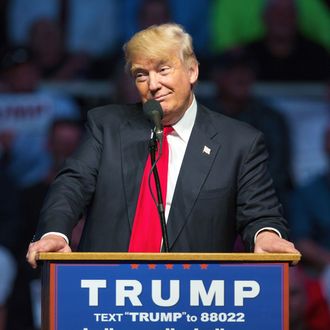
If Donald Trump wins the Indiana primary handily tonight and is generally deemed to be the “presumptive” if not “putative” Republican presidential nominee, there will be a lot of articles written with headlines echoing this one at Vox today, from Matt Yglesias: “Donald Trump is really going to be the nominee. This is actually happening.”
Lord knows we’ve all had plenty of time to get used to the idea. But it’s kind of like December of 2000: Every day you wake up and wonder if you’ve dreamed it all until the television comes on and there’s the nightmare of a recount, or of the GOP presidential front-runner casually endorsing a tabloid theory that his opponent’s father helped assassinate JFK.
Yikes.
Aside from Trump’s er, ah, style, there are a number of unusual, and in some cases unique, aspects of his background.
1. He’s the first major-party nominee since Dwight D. Eisenhower in 1952 never to have held elective office. Ike, of course, did defeat Nazi Germany, which is a bit more of a public credential than building a real-estate fortune and a TV career, but let’s don’t get too technical. If you think of Ike’s post-World War II service as Supreme Commander of NATO as an appointed public office, then Trump’s the first nominee to have neither elected or appointed political experience since Winfield Scott Hancock, the Democratic nominee in 1880.
2. Trump is the fifth major-party nominee to have been divorced, after Stevenson, Reagan, McCain, and Kerry. But he’s the first double divorcée.
3. He’s the first New Yorker to head a ticket since — this is the answer to a good trivia question — Richard M. Nixon in 1968. The Tricky One relocated from California to New York after his 1962 gubernatorial defeat in the Golden State. If you don’t consider Nixon a true New Yorker, you probably don’t consider Ike one either; so that would make Trump’s most proximate Empire State predecessor Thomas Dewey a mere 68 years ago.
4. Trump is the only the second major-party nominee with entertainment-business experience prior to entering politics. You could make a case his show business career has been more illustrious than Reagan’s. He wasn’t a football star like Gerald Ford was, but he did own a football team (just as Bush 43 once owned a baseball team). Trump is one of a few presidential nominees who published a widely read book before running for president, and it’s very likely The Art of the Deal outsold Ike’s war memoirs or JFK’s Why England Slept by a wide margin. None of these, of course, quite matches the literary value of Jefferson’s and Madison’s contributions to the Declaration of Independence or the Constitution of the United States.
5. It’s unclear if Trump is the wealthiest of presidential nominees. Without wading into iffy estimates and constant-dollar comparisons, he clearly outranks John Kerry with his cash-poor boarding-school education and John McCain with his four houses and likely the Bushes with their oil money. JFK and FDR may have had equivalent family fortunes in their day.
6. On the flip side of the ledger, Trump is not the first major-party nominee to resort to the bankruptcy laws. The most famous financially desperate former president was U.S. Grant, but William McKinley, and — according to one report — Abraham Lincoln and Thomas Jefferson had to obtain the protection of law against creditors.
In some respects, Trump’s not that unusual. If elected, he’d be the seventh or eighth Presbyterian in the White House (the number depends on whether you consider Reagan affiliated with his wife’s Presbyterianism or his own family’s Disciples of Christ). And he will be by my count the 76th man to receive a major-party nomination since the emergence of the Second Party System, in 1828 — and just the 75th white man! Some things never, or at least rarely, change.






























